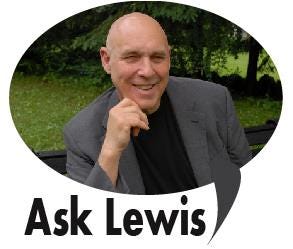Deep Thought Begins With Critical Thinking
Welcome to deep thought Thursdays
In order to have a truly meaningful and purposeful life, I believe, it is important to engage in critical thinking. By critical thinking, I mean engaging as much as possible, in bias free, objective analysis and evaluation of an issue, as well as evidence-based ideas (facts), in order to form a clear judgment.
—————————————————
“This subscription newsletter serves a demographic of highly intelligent readers, deep thinkers, life hackers, preppers, entrepreneurs, and survivalists. I especially focus on those with a passion for ideas, critical thinking, self-awareness, healing, the arts, personal development, and a desire to understand the world around them.
Readers of my posts are usually tired of being patronized elsewhere by fact-less, opinionated know-nothings, misinformation, conspiracy theories, and fake news.
—————————————————
“Knowledge is power, wisdom brings meaning, contentment, and happiness!”
—————————————————
This newsletter is a reader-supported publication. To receive new posts, and bonuses, and to become part of my Inner Circle please become a paid subscriber. (Sign up at the end of this newsletter)
—————————————————
On a personal note: Please excuse grammatical errors, typos, repetition, and any general nonsense, and such in this post. I am getting a bit older now, and I have about 20,000 pages of information that must get published before I leave the mortal coil. I simply write and publish more than my humble editors are able to correct. If you find enough errors you are welcome to contact me about being an editor of my work.
Thanks for sharing this newsletter with your friends and associates.
———————————————————
A 3-Minute Read
To want to become a critical thinker requires a love of both knowledge and wisdom. To act on this ‘love’ requires the systematized study of general and fundamental questions, such as those about existence, faith, truth, art, culture, history, reason, knowledge, values, ethics, morality, mind, strategic thinking, and language.
Questions related to these questions, are often posed as problems to be studied or resolved. The tools, techniques and methods employed by critical thinkers include questioning, critical discussion, rational argument, and systematic presentation.
Historically, critical thinking (called philosophy) encompassed all bodies of knowledge and a practitioner of this type of thought was called a philosopher.
Today (2022) various areas of investigation that were traditionally part of philosophy have become separate disciplines, including the formal sciences, computer science, the natural sciences and social sciences such as psychology, sociology, linguistics, political science, and economics.
Today, critical thinking may include:
metaphysics, which is concerned with the fundamental nature of existence and reality;
epistemology, which studies the nature of knowledge and belief;
ethics, which is concerned with moral value;
and logic, which studies the rules of inference that allow one to derive conclusions from true premises.
Critical thinking may also include notable subfields that may include religion, aesthetics, language, and the philosophy of mind.
Is Everyone Capable Of Deep Thinking?
Unfortunately no, and this is the source of many of the problems that plague humanity.
The majority of humankind is not interested in anything deeper than a tea cup. They are not interested in anything they cannot directly perceive, or have blind faith in. They are certainly not interested in anything abstract.
I am not judging them, however, most would rather follow orders and submit to rules and regulations and do as they are told to do, rather than think for themselves. In other words they are voluntarily sheep!”
The reason for this is simple and twofold.
Thinking requires both intelligence and effort, and can be mentally, emotionally, and physically difficult, and exhausting. Most people would rather focus their energy on day-to-day life, short-term gratification, what they can perceive on a surface level, and receiving and accepting the information their senses bring to them. Their sphere of thought is restricted to their immediate family, their immediate neighbors and their immediate society. They simply think, “I don’t know and I could care less of knowing.”
They are more concerned with their social status than knowledge, wisdom, or any type of awareness, never mind self-awareness.
I can tell you from personal experience, and not with any ego, or sense of superiority, that critical thinkers aren’t popular: They are visionary loners, eccentrics, weirdos, and freaks. Being a deep thinker is not going to raise your social status but rather is likely to stigmatize you.
I remember having a deep passion for a very beautiful woman, when I was in my late 20s. We became lovers for a short while. I was ecstatic. I asked her if she was happy being with me, and she responded emphatically “No”! She added, “When I am with you, I always have a headache. You think too much and make me think too much.” Then she broke up with me.
Interestingly we have kept in touch over the years, and I think that the trials, travails, and tribulations of life have given her a deeper appreciation of critical thinking and the benefits that come with it.
Why Those that Don’t Attempt Deep Thought Suffer?
Most people don’t care about self-improvement and personal development. If they do, they don’t connect that interest to reading quality news. They don’t watch plays. They do not watch movies outside the mainstream popular ones. They don’t go to concerts of different types of music – rock, hip-hop, classical, opera, jazz, toots-music, blues, folk, minimalist, chamber, or “world music.
They don’t care about history, art, culture, or politics. If they vote, they vote what for what is currently is popular, or for people who are idiotically ideological. Most people even vote against their own self-interests.
They do not participate on debates or discussions in the Internet. What they do is to watch TV, maybe party, and perhaps follow social media on the Internet. They do not understand any foreign languages, cultures, ideas, or societies, and don’t want to. They may even tell you, “It gives, me a headache”.
What they watch on television or on their smart device is sports, reality TV, music videos, soap operas, lowest common denominator sitcoms, and anything amusing, entertaining or stimulating in the moment. If TV is a drug, for them TV is essentially heroin, not Ayahuasca.
To be an original, critical, and deep thinking thinker requires many forms of intelligence. What the developmental psychologist Howard Gardner called the Multiple Intelligences.
Gardner introduced eight different types of intelligences consisting of:
Linguistic,
Logical/Mathematical,
Spatial,
Bodily-Kinesthetic,
Musical,
Interpersonal,
Intrapersonal,
Naturalist.
Over the years many critical thinkers have added other forms of intelligence to this list.
Most people explore one or maybe two of these.
5 Steps to Becoming a Deep Thinker
Create the right environment. The brain and the mind are affected by colors, sounds, shapes, textures, and the placement of “things” in a space. Naturally, noisy and highly distractive environments do not promote deep thinking. Be conscious about the design of your living and work space. Read a bit about interior design, Feng shui, and such.
Eliminate distractions. Distractions prevent you from concentrating on quality thoughts.
Learn to concentrate. This can be done by sitting in a mantra meditation when you awake, once in mid-day. A mantra meditation can be as simple as focusing on a meaningless word as it is repeated over and over. You can use the word “One” or “Ohm” to start.
Entertain higher-quality thoughts (find food for thought). I do this in a number of ways.
Political reasoning: We do live in a political world. Each morning I review some issue (Abortion, Gay Marriage, Libertarianism, Socialism etc.) from two diverse perspectives. I may choose a respected politically conservative voice, (The National Review), and then a progressively liberal perspective (The Daily Kos). To this, I add a non-politically aligned fact checker (Politofact.com).
Read about positive things that are happening in the world. For this I go to NiceNews.com
I Read a bit from some respected “deep thinker”. Lao Tzu, Plato, Confucius, Kant, Spinoza, Cato, etc.,
All of this take me about 30 minutes in the morning. I do it right after I do my “intuition” building routine of stretching, Tai Chi, and “Laughter Yoga”.
Final Thoughts.
I always tell my prepper and life hacker friends, especially those who are a bit extreme or paranoid in their thinking, that deep thought and critical thinking is important for mental and emotional health.
There are 7 Benefits of Critical Thinking
It encourages curiosity.
It enhances creativity.
It reinforces problem-solving ability.
It's a multi-faceted practice.
It fosters independence.
It's a skill for life, not just learning.
Improve decision making skills
——————————————————————————
——————————————————————————
A side note: Today is the 42 anniversary of the murder of John Lennon.
I was directly across the street from the former Beatles, musician, artist, and social activist when his life was snuffed out, in a moment of madness.
In my December 5, newsletter “Memoir Monday” I will describe my experience of that event.
——————————————————————————
——————————————————————————
Author: Hey there. My name is Lewis Harrison, and I created this newsletter. I am a transformational coach, teacher, and prepper. I am a proponent of entrepreneurism and also a writer and seminar leader. The author of over twenty books, and numerous self-improvement, business success, and personal development courses, I am the former host of a talk show on NPR Affiliated WIOX91.3 FM.
——————————————————————————
——————————————————————————
For more great articles, videos, advanced prepper tips, spiritual wisdom, and life hacks please upgrade to a paid subscription at the Self Improvement Inner Circle (Part of the Life Strategies Playbook).
Just click below the arrow to learn more…
This article is an excerpt from a seminar I taught based on my book “Beyond Thought”.
Here is the link to this book.
https://www.amazon.ca/Beyond-Thought-Introduction-Practical-Philosophy/dp/1079737219
”






